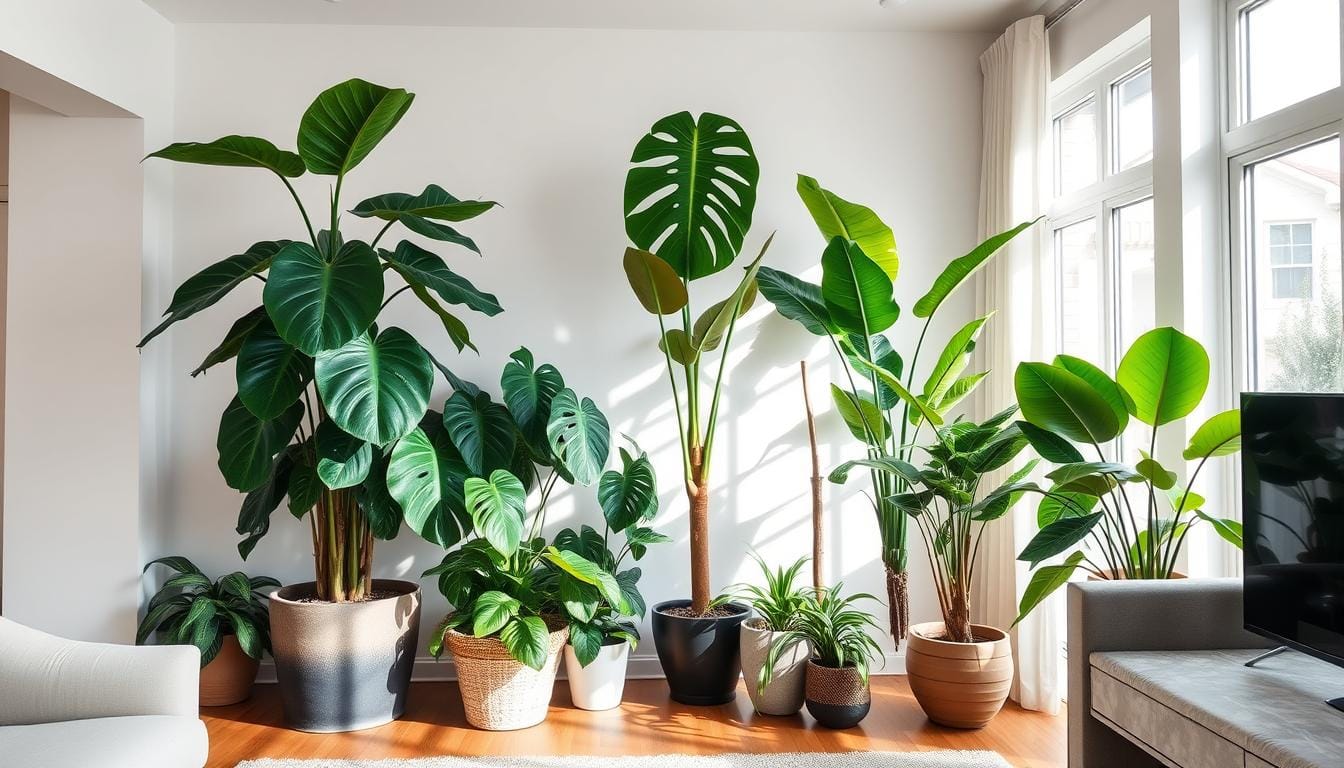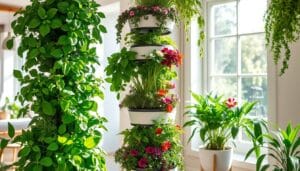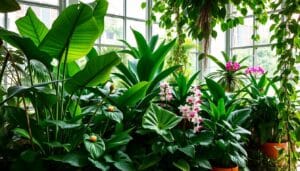Large house plants can make your living spaces more charming and inviting. These plants can change any room, big or small. They range from the stunning Bird of Paradise to the elegant Kentia Palm.
Adding large indoor plants to your home has many benefits. They make your decor look better and improve the air quality. These plants also help reduce stress and make your home a healthier place.
Key Takeaways
- Large house plants offer an effortless way to transform living spaces
- They provide visual interest, natural elegance, and health benefits
- Popular options include Bird of Paradise, Kentia Palm, and Fiddle Leaf Fig
- Choosing the right plant based on size, lighting, and care needs is crucial
- Proper placement and maintenance ensure the longevity and thriving of large indoor plants
Understanding the Impact of Large House Plants in Modern Spaces
Large statement plants are key in modern home designs. They add beauty and natural touches to our spaces. These large leaf plants can change how a room looks, filling empty spots, creating privacy, or softening hard lines.
Plants like Areca Palms and Bird of Paradise clean the air. They remove harmful chemicals like Xylene, Formaldehyde, and Toluene from indoor air quality. This makes them great for improving air and health in our homes.
Benefits of Adding Statement Plants to Your Home
- Stress reduction and anxiety relief
- Improved sleep quality
- Increased productivity and creativity
- Dust and allergen reduction
How Large Plants Change Room Dynamics
Placing statement plants wisely can change a room’s feel. They add privacy, interest, and soften hard edges. Their big presence and unique leaves make them standout in simple or Scandinavian designs.
Air Purification and Wellness Benefits
Research shows indoor plants clean the air, improving indoor air quality and health. Adding plants like Areca Palms and Snake Plants can greatly benefit our well-being.
Popular Tropical Giants for Indoor Spaces
Turn your home into a lush, tropical paradise with tropical indoor plants, big leaf plants, and indoor trees. These plants are not just beautiful. They also bring many benefits to your home.
The Philodendron ‘Lickety Splitz’ stands out with its unique split leaves. The Ficus Audrey Tree grows fast and can get quite tall. The Australian Umbrella Tree can reach up to 10 feet, making a bold statement in any room.
The Peruvian Apple Cactus loves bright light and has a special shape. On the other hand, the Alocasia Regal Shield (elephant ear plant) prefers moist air. It adds a touch of the exotic to your indoor space.
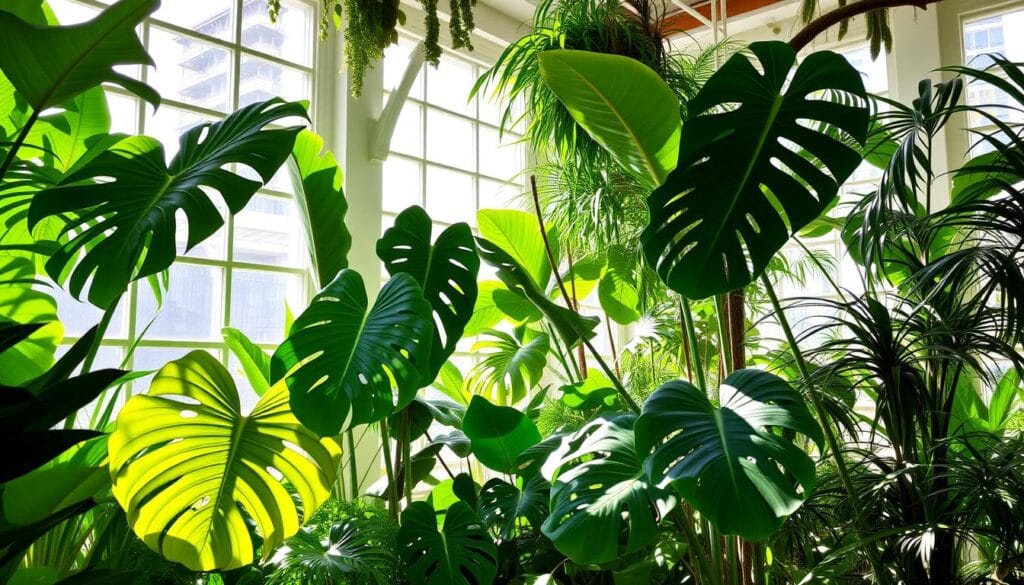
“These plants add a lush, exotic feel to interiors and can become striking focal points in any room.”
Looking to create a tropical oasis or add drama to your home? These tropical indoor plants, big leaf plants, and indoor trees will surely impress and change your home.
Architectural Plants for Statement Making
Architectural plants can really change your living space. Plants like the Bird of Paradise, Fiddle Leaf Fig, and Monstera Deliciosa stand out. They have bold shapes and grab everyone’s attention.
Bird of Paradise: The Ultimate Showstopper
The Bird of Paradise is a real showstopper. Its wide, waxy leaves remind you of tropical places. This indoor tree makes any room feel like a green oasis.
It loves bright, indirect light. So, it’s perfect for adding a touch of green to your architectural plant collection.
Fiddle Leaf Fig: Designer’s Choice
Interior designers love the Fiddle Leaf Fig. Its big, violin-shaped leaves add elegance to any room. This statement plant needs regular care and bright light to look its best.
Monstera Deliciosa: The Swiss Cheese Plant
The Monstera Deliciosa, or “Swiss Cheese Plant,” is a standout. Its unique leaves bring a touch of the tropics to your space. It grows fast and gets big, making it a real eye-catcher.
These indoor trees and statement plants can be the centerpiece of your home. They add style and elegance. With the right care, they can make your space look amazing.
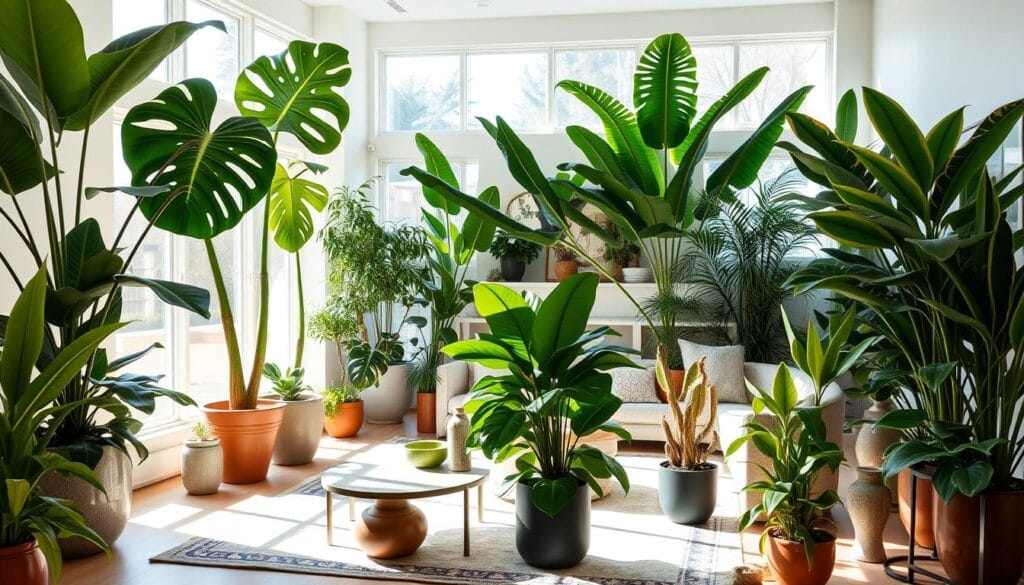
Large House Plants for Low-Light Environments
Transforming your living space doesn’t always need bright sunlight. Many large house plants do well in low light, perfect for dark corners or rooms with little natural light. The ZZ Plant and the elegant Snake Plant are great examples. They bring lush greenery to even the shadowiest spots.
The ZZ Plant (Zamioculcas zamiifolia) can handle very low light and doesn’t need much water. Its thick, waxy leaves and hardy nature make it perfect for dark indoor areas. The Snake Plant, or Sansevieria, also thrives in dim light and can survive neglect.
The Cast Iron Plant (Aspidistra elatior) adds sophistication to low-light areas, purifying the air and looking bold. The Chinese Evergreen (Aglaonema) is another good choice, with vibrant foliage that does well in less-than-ideal light.
When picking large house plants for low-light spots, think about their needs. With proper care and placement, these plants can make even the darkest areas feel welcoming and lush.
Top Low-Light Plants
- Snake Plant (Sansevieria)
- ZZ Plant (Zamioculcas zamiifolia)
- Parlor Palm (Chamaedorea elegans)
- Cast Iron Plant (Aspidistra elatior)
- Pothos (Epipremnum aureum)
- Dracaena Lisa
- Silver Evergreen (Aglaonema)
Maintenance Tips for Low-Light Plants
- Watering: Low-light plants need less water to avoid root rot.
- Lighting: Place near a north-facing window or in a room with indirect sunlight.
- Soil: Use well-draining, fresh potting soil as plants photosynthesize less.
- Cleaning: Dust off leaves regularly for optimal photosynthesis.
- Pruning: Trim dead leaves for new growth.
- Fertilizing: Use a balanced, gentle fertilizer sparingly.
- Pest Control: Inspect for pests like aphids or spider mites.
- Ventilation: Maintain proper airflow to prevent fungal growth.
By following these tips, your low-light plants will flourish. They’ll make your indoor space more inviting, even in the darkest corners.
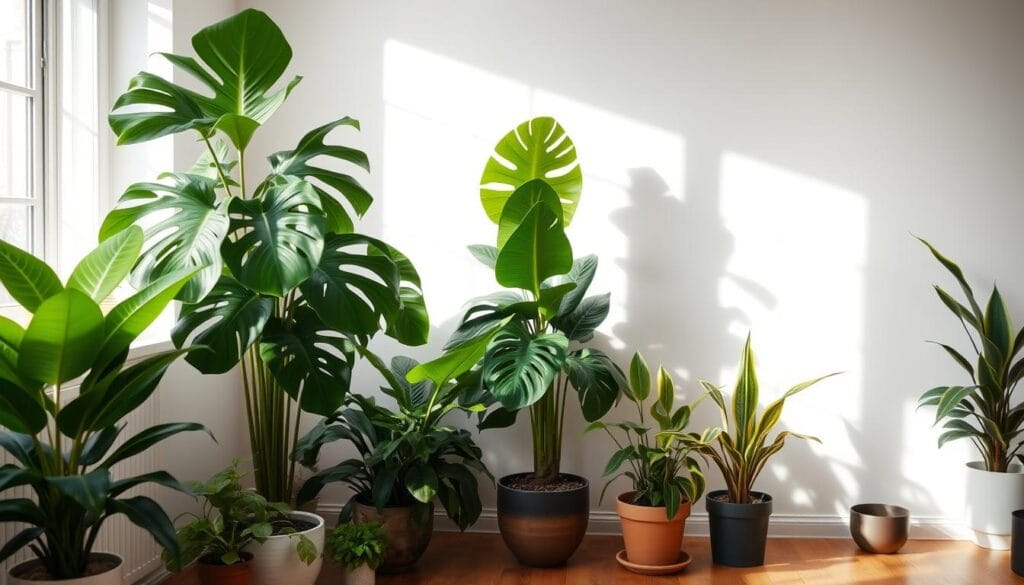
Palm Varieties for Indoor Grandeur
Indoor palms can turn any space into a tropical paradise. They add height and a calming feel to any room. From the elegant Kentia Palm to the air-cleaning Areca Palm, there’s a palm for every indoor spot.
Kentia Palm: The Elegant Classic
The Kentia Palm is a timeless choice for indoors. Its long, feathery leaves and ability to grow in low light make it perfect for homes. It’s elegant and easy to care for, adding tropical charm without the fuss.
Areca Palm: The Air Purifier
The Areca Palm is a top pick for its air-purifying skills. Its lush fronds and bushy growth make it a stunning addition to any room. It’s not just beautiful; it also helps clean the air, making your home healthier.
Parlor Palm: The Low-Maintenance Option
The Parlor Palm is great for those who want a low-care plant. It does well in indoor light and is easy to care for. Its elegant look and simple care make it perfect for beginners with large plants.
| Palm Variety | Mature Size | Light Requirements | Key Features |
|---|---|---|---|
| Kentia Palm | 6-12 ft tall | Tolerates low light | Elegant, arching fronds |
| Areca Palm | 6-8 ft tall | Bright, indirect light | Excellent air purifier, bushy growth |
| Parlor Palm | 4-6 ft tall | Moderate to low light | Elegant, low-maintenance |
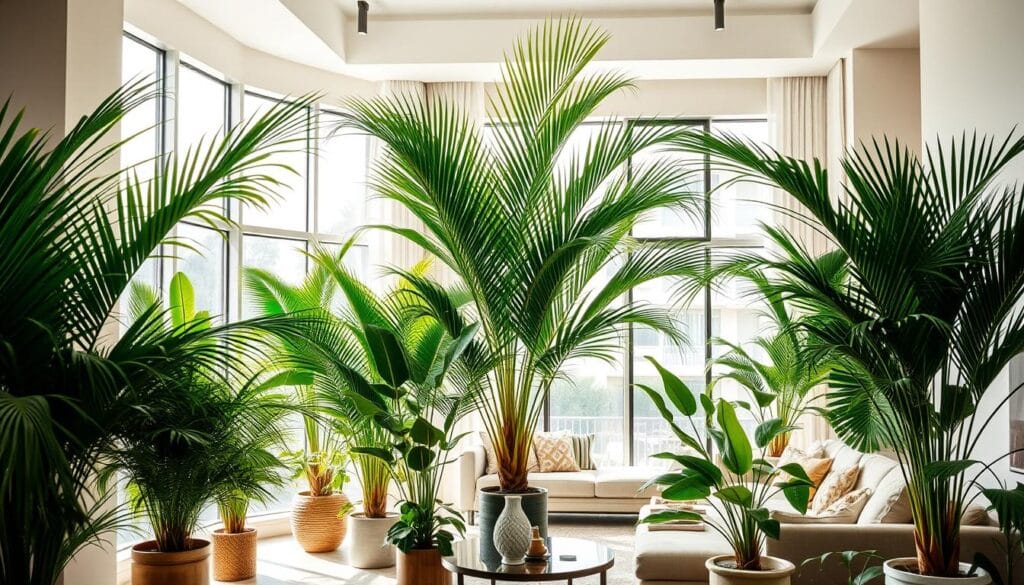
“Palms add a sense of tranquility and bring the tropics indoors, transforming any space into a soothing oasis.”
Bold Botanicals for Minimalist Spaces
Bold botanicals can really make a minimalist space pop. These statement plants add a natural drama that contrasts with clean lines and neutral colors. They bring a unique touch to any room.
The Rubber Plant (Ficus elastica) is a great example. Its large, glossy leaves grab attention. It fits well with modern designs, making it a great choice for any minimalist house plant collection.
The Snake Plant is another standout for minimalist spaces. Its vertical shape adds interest without taking over the room. It’s a perfect fit for simple interiors.
The Dracaena marginata also stands out. Its slender trunk and spiky leaves add height and drama. Its colors are muted, keeping it in line with minimalist style.
These plants offer a perfect mix of simplicity and impact. They’re great for adding elegance to minimalist spaces. By adding these statement plants, you can make your space more visually appealing and balanced.
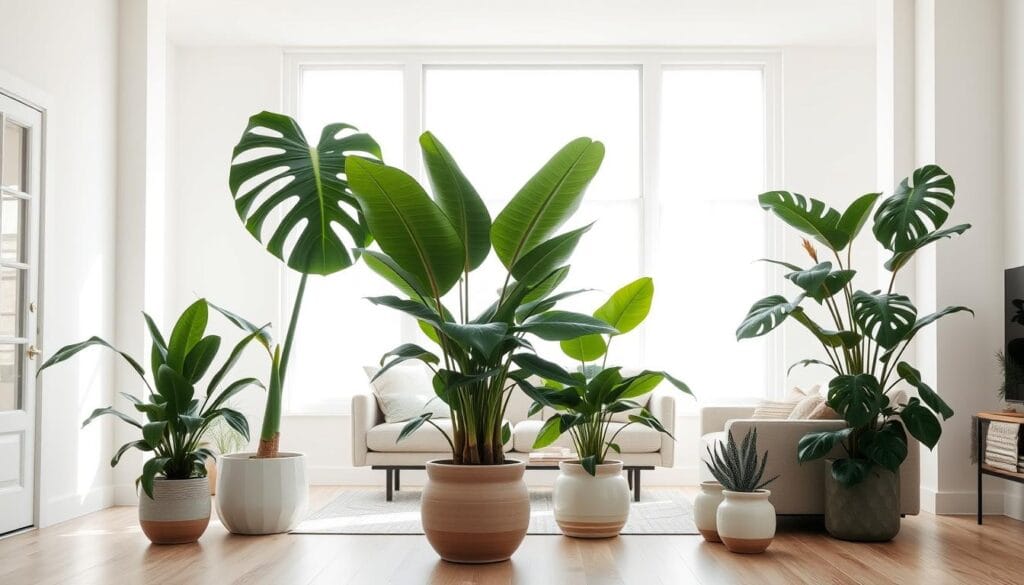
“Minimalism is not a lack of something, but the perfect amount of something.”
Care Guide for Oversized Houseplants
Caring for big indoor plants needs more effort than small ones. You must know their watering and light needs. This is key for their health and growth.
Watering Requirements
Big indoor plants can grow from 10-inch to 21-inch pots. They can cost up to $2,000 at specialty stores. These plants like their soil to dry a bit before watering. How often you water depends on the plant, soil, and environment.
Light and Temperature Needs
Light is vital for big plants’ green leaves. Most tropical plants love bright, indirect light. But, some like it dimmer. Keeping the temperature between 60-75°F (15-24°C) helps them grow best.
Maintenance Tips
Keeping big plants healthy means regular care. Dust their leaves to help them breathe. Prune dead parts and rotate the plant for balanced growth. Fertilize during growth seasons and repot every 2-3 years.
With proper care, oversized houseplants can make any room special. They bring tropical beauty and clean the air in your home.
Living Sculptures: Statement Floor Plants
Turn your living space into a stunning oasis with statement floor plants. These tall beauties fill vertical space and become eye-catching focal points. They add a natural art touch to any room. The Fiddle Leaf Fig and the Bird of Paradise are just a few examples. They offer many options to enhance your decor.
The Dragon Tree (Dracaena marginata) stands out with its slender trunk and spiky leaves. It looks like a palm and grabs attention. These plants also purify the air and bring peace to your home.
“Oversized houseplants can truly transform a room, adding drama, height, and a touch of the outdoors to any space,” shares an expert from Monrovia, a leading provider of high-quality plants.
Looking to make a statement in your home? These floor plants and indoor trees are perfect. They can make a stunning entryway or fill a corner. Their striking looks and lush foliage will inspire and captivate.
When setting up your indoor oasis, remember the special care these plants need. Right watering, lighting, and care will help them thrive. Let floor plants, indoor trees, and living sculptures transform your space. They’ll create a beautiful and harmonious environment that shows off your style and love for nature.
Best Large Plants for Beginners
Starting with indoor gardening can seem scary, especially with big plants. But, there are many easy plants that can make your space look great without needing a lot of care.
ZZ Plant: The Foolproof Choice
The ZZ Plant (Zamioculcas zamiifolia) is almost impossible to kill. It can handle little light and doesn’t need much water. It can grow up to 3-5 feet tall and 2-3 feet wide, adding a big touch to your room.
Snake Plant: The Resilient Giant
Snake Plants (Sansevieria) are also very forgiving. They do well even when you forget to water them. These plants can grow up to 4-6 feet tall, adding a striking look to your space with little effort.
Rubber Plant: The Forgiving Beauty
Rubber Plants (Ficus elastica) are great for beginners. They can grow 6-10 feet tall and handle different light levels. They also bounce back quickly if you forget to water them, making them a safe choice for new gardeners.
These plants are perfect for beginners. They offer the look of big plants but are easy to care for. They’re great for starting your indoor gardening journey.
Choosing the Right Pot and Placement
Choosing the right pot and placement is key for large house plants. The pot should match your decor and drain well. Make sure the pot is big enough for your plant to grow into. For pots under 10 inches, add 1-2 inches. For bigger pots, add 2-3 inches.
Where you place your plant is just as important. Think about the light it needs, foot traffic, and how it will look. Plants like the Kentia Palm do well in low light. The Fiddle Leaf Fig needs bright, indirect light to look its best. Placing your plants right can make a room look amazing and peaceful.
Choosing the Right Plant Pots
When picking a pot for your indoor plant, think about these things:
- Material: Terracotta, wood, or porous ceramics help roots dry out, avoiding rot.
- Drainage: Make sure the pot has holes for water to drain, keeping roots healthy.
- Aesthetics: Choose a pot that looks good with your design and the plant’s look.
Optimal Indoor Plant Placement
Placing your plants well can make a room look better. Here are some tips:
- Put plants in the right light, like bright indirect or low light.
- Stay away from busy areas to avoid damage, unless the plant is tough.
- Place big plants to add interest and calm to a room.
By picking the right pot and spot, your big house plants will do well. They’ll also make your container gardening space look great.
Seasonal Care and Maintenance Tips
Caring for big houseplants means changing how you do things with the seasons. In spring and summer, water them more often and use a balanced fertilizer. This helps them grow strong. In winter, when it’s drier, add humidity for plants that love it wet. You can mist their leaves or use a pebble tray.
Watch how much light your plants get and move them closer to windows in winter. But keep them away from direct sunlight in summer. Also, check for pests and diseases, especially in winter. Aphids and scale like the cooler months.
Keep your plants looking good by pruning old or damaged leaves. Also, gently clean off dust from their leaves. This makes them look better and helps them breathe and absorb nutrients. A bit of care each season will keep your indoor garden happy all year.


